New admissions director looks to help applicants tame the grad school jungle
November 4, 2019
Alumna Arameh Anvarizadeh working towards a holistic admissions process
Academics and Courses Diversity, Access, Equity Faculty
By Mike McNulty
“Maybe it’s the leo — the lioness — in me, wanting to tame the jungle,” says Associate Clinical Professor Arameh Anvarizadeh ’05, MA ’06, OTD ’07, who has been newly appointed as director of admissions for the USC Chan Division. “I’ve always been interested in the power of the brain, in how people think, communicate, behave and act in everyday life.”
If the human mind is a jungle, Anvarizadeh has been taming it with a career in occupational therapy. A onetime USC undergraduate with her sights set on medical school, it was a recruitment pitch before an organic chemistry class that introduced her to her future calling. A few classes later, she was sold.
“My philosophy has always been about continuum of care and quality of life, so I have always been intrigued by what occupational therapists can provide for others.”
Since completing her graduate degrees at USC, Anvarizadeh has spent the past 12 years in a number of practice settings, including with the publicly funded California Children Services program, as a consultant and doing per diem work in adult rehabilitation. She taught occupational science for Howard University, started her own private practice, directed fieldwork education as a faculty member at West Coast University’s occupational therapy program and has served in leadership positions of the Occupational Therapy Association of California and the American Occupational Therapy Association.
Now, Anvarizadeh is back at her alma mater to begin taming a whole different kind of jungle: USC Chan’s admissions operations.
That is no small task. Each year, USC Chan’s three-person admissions team reviews nearly five applications for every available seat in the entry-level master’s program, the largest of the division’s five degree-granting programs.
But for Anvarizadeh, simply handling the sheer volume of applications comes second to improving the overall quality of each and every person’s admissions experience. To that end, one of her first goals on the job has been to increase access and transparency throughout the application and scholarship process, starting with a new Scholarships and Financial Aid webpage.
Her next big project has been instituting what is known as a “holistic admissions” process. Holistic admissions processes are intentionally designed to evaluate applicants beyond quantitative metrics like GPA and GRE scores. Such “non-cognitive” factors — qualitative elements such as an applicant’s past leadership experiences, capacity for compassion and demonstrated professionalism — should carry more weight in admissions considerations, Anvarizadeh argues.
“My goal is to make USC the gold standard for holistic admissions that can serve as a model for all of occupational therapy higher education,” she says. “We can develop rubrics in a way that fairly and comprehensively assess those factors, so that we’re not only admitting outstanding students, we are training great future occupational therapists.”
As a step towards holistic admissions, Anvarizadeh and her admissions colleagues, Assistant Clinical Professors Amber Bennett MA ’13, OTD ’14 and Kristin Nxumalo MA ’14, OTD ’15, will be trialing a two-phase admissions process that includes an invited video submission. The idea is to empower those applicants who might not otherwise stand out on paper with a chance to explain, in their own words, their motives for pursuing a career in occupational therapy. A brief video narrative is one means of letting personalities shine.
In the end, Anvarizadeh sees holistic admissions as a tool for assembling a more diverse student body without compromising academic potential.
“Diversity breeds innovation, it yields richer dialogues in the classroom and ultimately creates a more diverse professional workforce that can better bridge gaps to reduce health disparities.”
As for the advice she gives to prospective students looking to tame what can seem like a jungle of graduate school admissions?
“Be authentic, share your story and showcase your passion for occupational therapy.”
⋯






